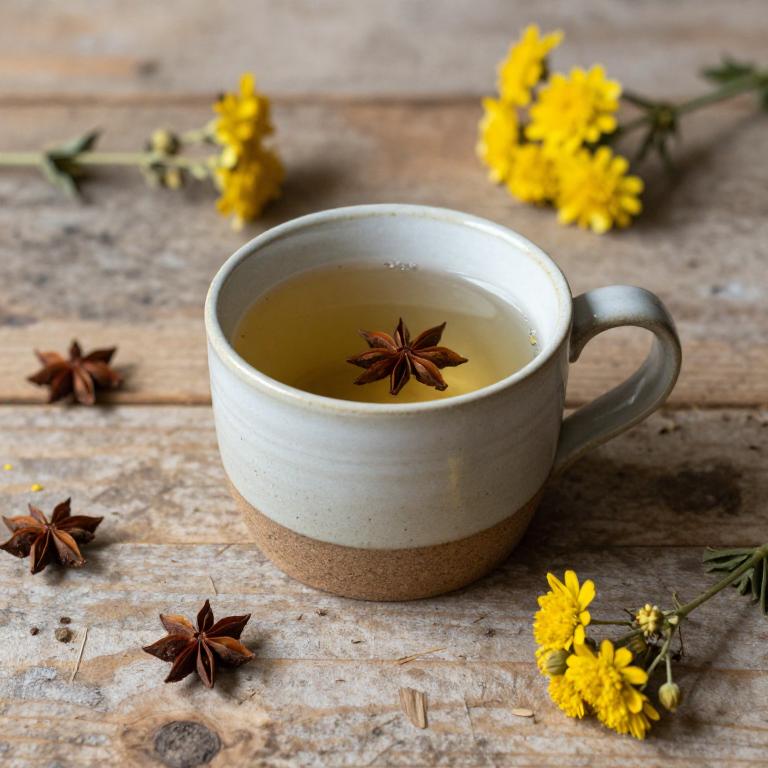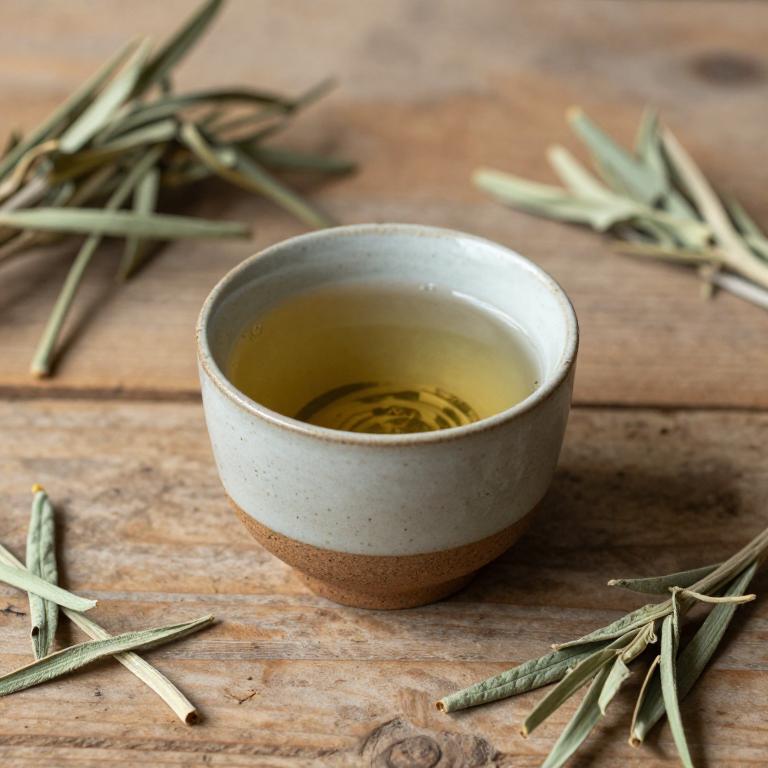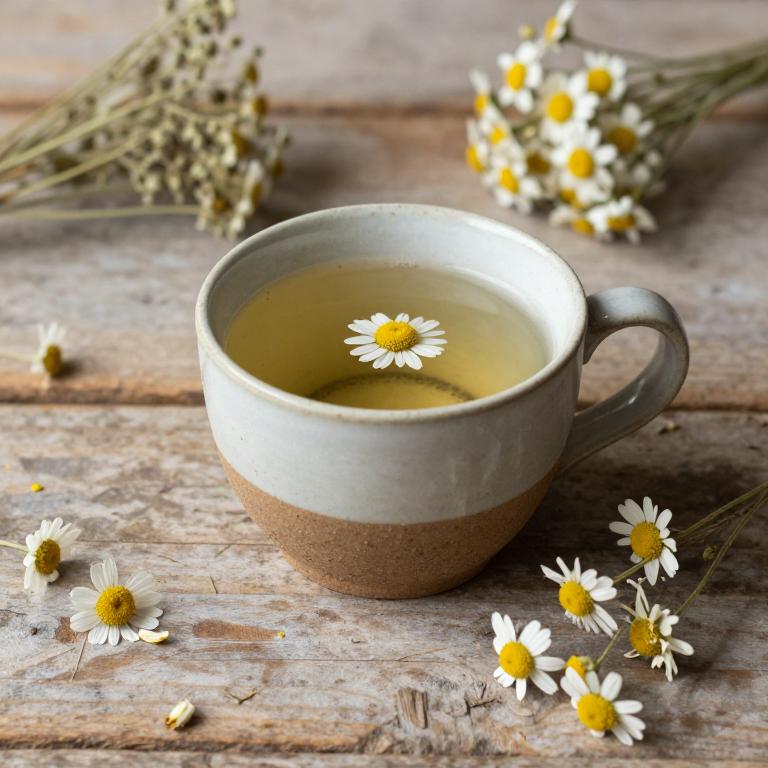10 Best Herbal Teas For Flatulence

Herbal teas can be beneficial for reducing flatulence by promoting digestion and easing gastrointestinal discomfort.
Herbs such as fennel, ginger, and peppermint are commonly used in teas to soothe the digestive system and reduce gas buildup. These natural remedies work by relaxing the muscles in the digestive tract and aiding in the breakdown of food. However, it's important to note that individual responses to herbal teas can vary, and some people may experience increased gas as a side effect.
As with any dietary change, it's advisable to consult a healthcare professional before incorporating herbal teas into your routine.
Table of Contents
- 1. Fennel (Foeniculum vulgare)
- 2. Cumin (Cuminum cyminum)
- 3. Thistle (Silybum marianum)
- 4. Anise (Pimpinella anisum)
- 5. Peppermint (Mentha piperita)
- 6. Lemon grass (Cymbopogon citratus)
- 7. Stinging nettle (Urtica dioica)
- 8. Thyme (Thymus vulgaris)
- 9. German chamomile (Chamomilla recutita)
- 10. Dog rose (Rosa canina)
1. Fennel (Foeniculum vulgare)

Foeniculum vulgare, commonly known as fennel, is a popular herbal remedy used in teas to help alleviate flatulence and digestive discomfort.
The seeds of the fennel plant contain compounds such as anethole and flavonoids, which have carminative properties that help reduce gas and bloating. Fennel tea is often consumed after meals to promote digestion and ease the discomfort of excess gas in the gastrointestinal tract. It is also believed to have a mild warming effect on the stomach, further supporting digestive health.
While generally safe, fennel tea should be used in moderation and may not be suitable for everyone, especially those with allergies or specific medical conditions.
2. Cumin (Cuminum cyminum)

Cuminum cyminum, commonly known as cumin, is often used in herbal teas to help alleviate symptoms of flatulence.
The essential oils in cumin, such as limonene and cineole, are believed to aid in digestion by stimulating the production of digestive enzymes. Drinking cumin tea can help reduce gas buildup in the intestines and ease bloating. It is typically prepared by steeping ground cumin seeds in hot water for several minutes.
While generally safe, individuals with digestive sensitivities should use cumin in moderation to avoid potential discomfort.
3. Thistle (Silybum marianum)

Silybum marianum, also known as milk thistle, is a herbal remedy commonly used in teas to support digestive health.
While primarily known for its liver-protecting properties, some studies suggest that it may help alleviate digestive issues such as flatulence by promoting healthy digestion and reducing gas buildup. The active compound, silymarin, is believed to have mild anti-inflammatory and antioxidant effects that can soothe the gastrointestinal tract. However, it is important to note that while silybum marianum may offer some relief for occasional flatulence, it should not replace medical advice for persistent digestive problems.
As with any herbal remedy, it is advisable to consult a healthcare professional before incorporating it into your routine.
4. Anise (Pimpinella anisum)

Pimpinella anisum, commonly known as anise, is a popular herb used in herbal teas to help alleviate flatulence and digestive discomfort.
Its seeds contain compounds like anethole, which have carminative properties that can help reduce gas and bloating in the digestive system. Anise tea is often recommended for those experiencing mild gastrointestinal issues due to its gentle and soothing effects. To prepare the tea, simply steep a teaspoon of dried anise seeds in hot water for several minutes.
Regular consumption of anise herbal tea may promote better digestion and provide relief from occasional gas and stomach discomfort.
5. Peppermint (Mentha piperita)

Mentha piperita, commonly known as peppermint, is widely used in herbal teas to alleviate symptoms of flatulence.
The essential oils in peppermint, particularly menthol, help relax the muscles of the gastrointestinal tract, reducing gas buildup and bloating. Peppermint tea is often recommended for individuals experiencing digestive discomfort due to its soothing and carminative properties. It can be consumed either hot or cold, making it a versatile remedy for daily use.
However, it is important to consult a healthcare provider before regular use, especially for those with conditions like GERD or IBS, as it may have varying effects on different individuals.
6. Lemon grass (Cymbopogon citratus)

Cymbopogon citratus, commonly known as lemongrass, is a popular herb used in herbal teas to aid digestion and reduce flatulence.
The tea is valued for its pleasant citrus scent and calming properties, which can help soothe the digestive system. Lemongrass contains compounds like citral and other essential oils that may help relax the gastrointestinal muscles, thereby easing bloating and gas. Regular consumption of lemongrass tea may support healthy digestion and alleviate symptoms of gas and bloating.
It is often recommended as a natural remedy for those experiencing occasional digestive discomfort.
7. Stinging nettle (Urtica dioica)

Urtica dioica, commonly known as stinging nettle, is a herb that has been traditionally used in herbal teas to aid in digestive health.
When brewed into a tea, stinging nettle is believed to help reduce flatulence by promoting healthy digestion and alleviating gastrointestinal discomfort. The plant contains compounds that may support the elimination of excess gas from the digestive tract. It is often recommended for individuals experiencing bloating or frequent gas due to its mild diuretic and anti-inflammatory properties.
However, it is important to consult with a healthcare provider before using stinging nettle tea, especially for those with existing medical conditions or who are taking medications.
8. Thyme (Thymus vulgaris)

Thymus vulgaris, commonly known as thyme, is a popular herb used in herbal teas to aid digestion and alleviate symptoms of flatulence.
The essential oils in thyme, particularly thymol, have antimicrobial properties that can help reduce gas-causing bacteria in the digestive tract. When brewed into a tea, thyme can soothe the gastrointestinal system and ease bloating and discomfort. Its warming properties also help stimulate digestion, preventing the buildup of gas.
Regular consumption of thyme herbal tea may support overall digestive health and reduce the frequency of flatulence.
9. German chamomile (Chamomilla recutita)

Chamomilla recutita, commonly known as German chamomile, is a popular herbal tea often used to alleviate digestive issues, including flatulence.
Its calming properties are attributed to the presence of compounds like bisabolol and apigenin, which have anti-inflammatory and antispasmodic effects on the gastrointestinal tract. Drinking chamomile tea can help reduce gas and bloating by soothing the digestive system and promoting regular bowel movements. It is typically consumed as a mild, caffeine-free beverage, making it a safe option for many individuals seeking natural relief from discomfort.
However, while chamomile is generally well-tolerated, some people may experience allergic reactions, so it is advisable to consult a healthcare provider before regular use.
10. Dog rose (Rosa canina)

Rosa canina, also known as rosehip, is a popular herbal remedy often used in teas to support digestive health.
This herbal tea is known for its high content of vitamin C, antioxidants, and anti-inflammatory compounds, which can aid in reducing gastrointestinal discomfort. Rosa canina tea may help alleviate symptoms of flatulence by promoting healthy digestion and reducing gas buildup in the intestines. It is typically consumed as a warm infusion, and its mild, slightly tart flavor makes it a pleasant choice for daily use.
However, individuals with sensitive stomachs should consult a healthcare provider before incorporating it into their routine.